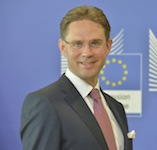
A first-mover advantage to enhance European competitiveness
On 16 January the European Commission adopted the first ever Europe-wide Plastics Strategy. It is an important milestone for our agenda to establish a truly functional circular economy in Europe.
To me, the Plastics Strategy is of particular importance it being a decisive step towards creating a genuine Single Market for plastics in Europe.
It will help to tackle the challenge of ever increasing marine litter and at the same time give the economic impetus to European business. A clear win-win.
Plastics are a part of our daily lives. Most of us are in contact with plastics, in one shape or form, each day.
We feel bothered by throwing away single-use plastics that will take more than a century to decompose, while knowing that recycling options are limited.
It is so, since most plastic compounds cannot be mixed in recycling, which means that their lifespan and eventual reuse is very limited.
We need standards in plastics production for this reason especially in single-use plastic packaging, which accounts for nearly 60% of all plastic waste in Europe each year.
According to estimates, only 5% of the value of plastic packaging material is retained in the economy. The rest goes to waste after a very short lifespan.
The annual bill for our economies amounts up to €105 billion. We simply cannot afford this type of behaviour in the long-term.
Our circular approach, where plastics are standards-based, will generate an economic incentive to put waste materials back into the economy.
This will create new opportunities for European companies.
One thing must be clear our strategy is not just about recycling. We have proposed to rethink and improve the functioning of the entire complex value chain, from plastic producers, designers, retailers to recyclers and consumers.
The aim is that by 2030, all plastics packaging must be reusable or recyclable. This will require a much higher uptake of recycled plastics in new products, which currently is only at 6%.
By creating more stable markets for recycled plastics we aim to ensure that the demand for recycled plastics is quadrupled in the next 12 years.
A genuine Single Market for recycled plastics would broaden an existing unsaturated market and create new submarkets, while attracting additional investment into Europe.
Simultaneously we will enable businesses and Member States to upgrade their waste management infrastructure by support through the EU structural funds, the European Fund for Strategic Investments (EFSI) and the EU research and innovation programme Horizon 2020.
For instance, the Horizon 2020 has already financed €250 million worth of plastic-related innovations, with an additional €100 million being made available.
For our Plastics Strategy to function, we need to increase our recycling capacity across Europe, which means devoting significant financial resources towards improving the material quality of recycled plastics.
Of course, reducing plastic waste is not merely about recycling existing plastics, but also about substituting plastics with more sustainable solutions.
Our Strategic Research Innovation Agenda for Plastics, which will be developed later this year, will focus on developing smarter and more recyclable plastic materials and products, more efficient recycling processes, removal of hazardous substances and contaminants from recycled plastics, and solutions addressing the problem of microplastics.
By being first-movers and innovative in this field, we can most effectively secure the competitiveness of the plastic industry in Europe, which employs directly and indirectly as many as 1.5 million people.
It is important for us to set things right from the beginning. It is always the case that good policies put in place in Europe are copied elsewhere across the world.
Thus the goal of Plastics Strategy is not only to have a positive impact in Europe, but to lead the global strategy on recyclable and reusable plastics.




